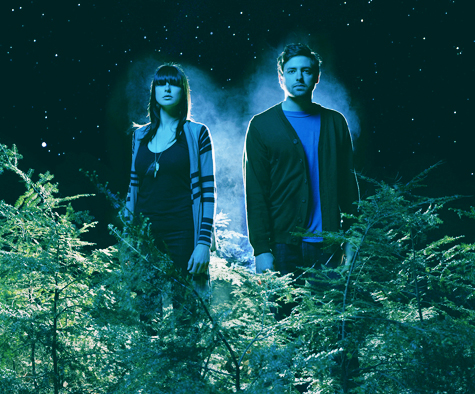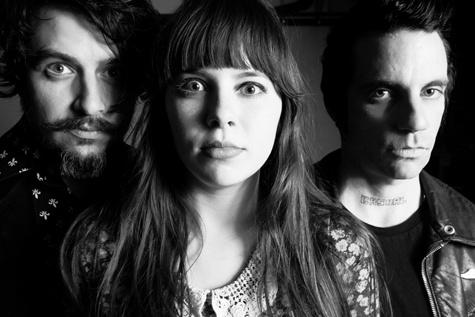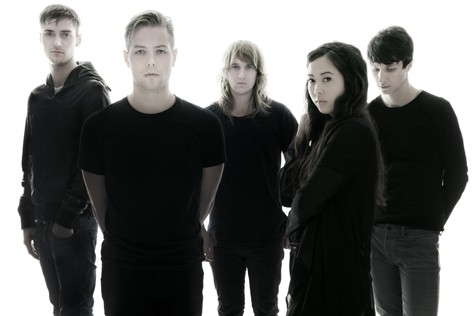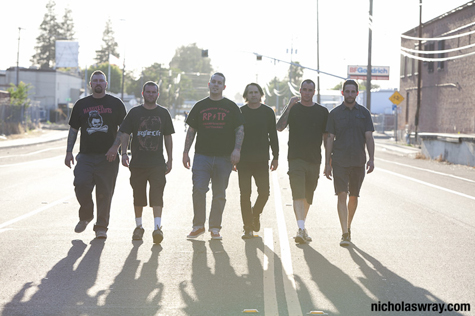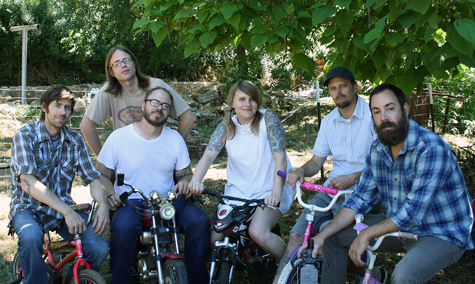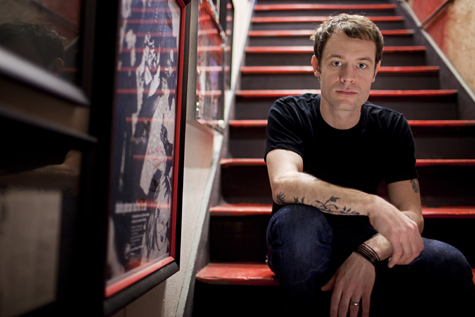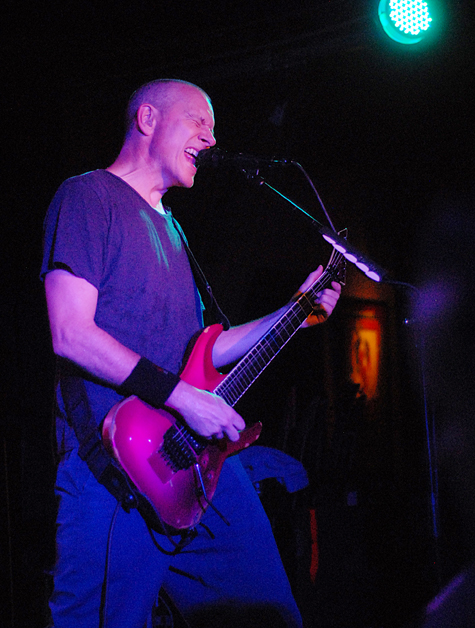Phantogram Moves in the Right Direction
Formed in 2007, New York’s Phantogram is just starting to hit its stride. The band, based out of the quaint rural town of Saratoga Springs, is the brain child of Sarah Barthel and Josh Carter. The two have been lifelong friends, but just started making music together relatively recently. Just last year, the duo released its debut full-length, Eyelid Movies, on indie label Barsuk, and Phantogram has more or less been hitting the road to promote it ever since. This fall, Carter and Barthel are set to hit the road again on a month-long headlining tour that will coincide with the release of a new “mini album” titled Nightlife.
Carter hasn’t been taking the rigors of being a band on the rise lightly. Submerge’s first attempt to call the band’s songwriter for our interview was left unanswered. As it turned out, the interview occurred a few hours later. An apologetic Carter confided in us that he was out for a run during our scheduled interview time–an effort to “change up my lifestyle a bit,” he said.
“I’ve been smoking a pack a day for about 10 years–of Newports, nonetheless. That’s like the worst cigarette you can smoke,” Carter explained. “I just want to get healthy, you know? I feel like it will be good for my music. I’ve spent a lot of time on the road drinking way too much and drugging and smoking.”
Carter said he started running about two weeks prior to our phone call. Though he hasn’t been able to cut out the cigarettes just yet, he seemed determined to kick the habit.
“I’m on Chantrix, so hopefully I don’t murder anybody,” he said plainly.
Though this is a new regimen for him, he said he thinks it will ultimately not only improve his well being but also improve his potency as a songwriter.
“People have told me they hit this stride–well, it was my dad, actually–they hit this stride where it clears their minds,” Carter said. “That hasn’t happened yet, but I think it’s going to be a good balance for my life and help my creativity.”
He’ll need all the clarity he can get with the band’s upcoming schedule. The most recent headlining tour, which begins Oct. 20 in Millvale, Penn., will take Phantogram through some cities it hasn’t been to before, such as Santa Fe, N.M.; Baton Rouge, La.; and Houston, Texas. Carter said that he’s looking forward to the challenges of winning over new faces.
“I’m curious as to what kind of draw we’ll have or not,” he said. “But it’s fun to hit up new cities, and sometimes it’s pleasantly surprising, and sometimes it’s just what you expect, like, ‘OK, no one’s ever heard of us here,’ but a show is a show. And either way, we enjoy playing.”
The tour comes on the heels of an eight-week stint that wrapped up in mid-August and an appearance at this year’s Bumbershoot in Seattle in early September. On top of that, Carter said he has an “itch to create” that compels him to be “constantly writing music or making beats.” In fact, Carter said he’s already looking forward to getting back to the studio to make another full-length Phantogram album.
Until then, there’s the matter of Nightlife, which Carter told us would be released the first week of the tour. He called it a bit of a departure from Eyelid Movies, though “it points in that direction.” As far as direction goes, it’s difficult to pin down where Phantogram’s moody songs are coming from. Hip-hop beats bump and grind behind Barthel’s dream pop vocals, while guitar lines slither through a forest of lush synths. He elaborated on why Nightlife may have a more of a raw sound than its predecessor and hinted at what direction Phantogram may be headed in the following interview.
I read a recent live review of your band, and the reviewer said that he’d seen you before, but now you really seem to be coming into your own. Do you feel that on stage? You and Sarah have known each other forever, but are you really noticing a stronger bond when you perform live?
I just think that we’re a new band. We’re pretty young. I just think that we’re getting better at it. I don’t know if you’re a musician or an artist or whatnot, but it takes time to really hit your stride and get in your groove with those sort of things. I think we’re getting better and better every day as a band, and it’s been a lot of fun. We’ve hired a drummer, a friend of ours named Tim Oakley, and that makes it a lot of fun live. I really don’t know what to say. Whoever wrote the review could have seen us as a two-piece and then saw us with the live drums and felt that dynamics change or whatever, but it’s all about just kind of doing it a lot.
Why did you decide to add a live drummer to the mix?
We envisioned our sound to be bombastic and loud, but after a while of playing as a two-piece, we got sick of being just a two-piece, looking at each other. I had played in a few bands before, and I’d turn around and there’d be no one behind me. It was a lot of fun as a two-piece, like, juggling around with the beats and sampling, but we just wanted to add more texture, more dynamic to the live show. We thought having a drummer would make it a lot punchier.
I’d seen the video clip of you guys at the Moog headquarters recording “16 Years.” It’s a really cool video, and it must have been a lot of fun getting to play with all that equipment.
We were like kids in a candy shop, you know? Playing with all that cool, analog gear was so much fun, but as much recording and producing that I do, I’m still not a gearhead, per se. It takes me longer to figure out things, and we had limited time, but we had a lot of fun with what we chose to use. We made a pretty cool rendition of that song, I think. Everybody at Moog was super friendly. They sent us a Little Phatty synthesizer too for doing that, which was amazing. I had a blast, and we got to see the factory. It was in the factory, and I had never realized how much of a boutique company it is. They only had 10, 15 people tops working in there, testing out the oscillators by hand. Their equipment is expensive, but you can really see why because there’s so much attention to detail.
How did that come about?
They asked us to be part of their series that they wanted to start. Since they knew we were into synthesizers and thought we would be a cool band to have.
Earlier you mentioned that the new EP is in some way a departure from Eyelid Movies. Why do you think it’s a departure?
It’s definitely in the same vein to a degree, but when I listen to it, I hear a lot of emotion. I hear a lot of emotion in Eyelid Movies too, but it’s raw. It’s a bit more…hmm…I don’t know. I don’t really listen to our music that often. I wish I could compare and contrast, but it’s rawer, and it feels very emotional to me. Maybe it’s just a departure for me because it’s new. I guess we’ll have to wait and hear what other people think.
Was it the subject matter of the songs that make the new release feel more raw?
It’s really dark subject matter when I write our songs. I write a majority of our music and write the lyrics to our music. This year for me and Sarah–I’m not going to elaborate, so don’t bother asking–but it hasn’t been the easiest year on us emotionally. It’s been a great year for us being in a band, but we’ve gone through a lot of ups and downs. The subject matter hits really hard, really close to home for me.
You said you’re really looking forward to doing another full-length next. Have you put any thought into that yet?
Not exactly hunkering down. Just about every night of the week, I’ll hunker down and work on something, but we do at the moment have a mission statement for the next album. But I’m such a flaky person that that could change in a second. I expect the next album to have a lot more separation sonically. I sort of picture things–and both of us do when we write our music–in a visual sense. Right now we’re thinking really stark, high-contrast black and white. But who knows? Maybe we’ll put out this super duper layered, drone-y, shoegaze, hip-hop, whatever-the-fuck psychedelic record. I don’t know.
Could you share that mission statement?
I think we should keep it under wraps, because it could change.
Mystery is better anyway.
We both listen to so much different kinds of music that we’re not influenced by anything in particular. I think after touring with The XX and listening to that new James Blake record, I really like the idea of more separation, and I guess minimalism to a degree.
Phantogram’s headlining tour comes through Sacramento on Nov. 1, 2011 at Harlow’s. Showtime is 8 p.m. and tickets ($15) can be purchased through Harlows.com. Reptar will also be performing.
Local promoter Brian McKenna recently confirmed the much-hyped garage-punk trio Le Butcherettes for a Sept. 14 gig at Harlow’s, and we here at Submerge could not be more stoked. This in your face, rowdy-as-fuck band had one of the most blogged-about sets at this year’s Lollapalooza, recently toured with Sacramento’s own Deftones, and will soon embark on separate stints with Iggy and the Stooges and The Flaming Lips. You don’t score gigs like those unless you’re doing something right. The Los Angeles-based group has local ties in bassist Jonathan Hischke (pictured on left), who has played with and/or toured/recorded with such local-ish bands as Hella, Agent Ribbons, Casual Fog and a ton of others as well as national acts like The Mars Volta and Broken Bells. If you’re a fan of spastic, energetic, borderline obscene live performances, you’re going to want to mark your calendars for this one, as lead singer Teri Gender Bender is known to throw shoes into the crowd, spit a lot and douse herself in fake blood–you know, the whole nine. Hischke and drummer Gabe Serbian (formerly of The Locust) get down too, which creates a sort of chaotic, yet somehow controlled vibe. It ought to be interesting seeing a (hopefully) primed and drunken Sacramento crowd react to their onstage energy. I’m forecasting much spilled beer, intermittent mosh pits and a high possibility of stage diving in Harlow’s near future. Show is $8 in advance, 21-and-over only and doors open at 8 p.m. Opening the show will be locals I’m Dirty Too and Diciembre Gris. For more information, visit Harlows.com, Abstractsacramento.com or hit up The Beat or Dimple Records to score tickets.
The Naked and Famous’ formula for international fame
Parents often discourage their children from getting involved in creative fields. Rightfully so. Success in music, art or filmmaking is difficult to obtain. Not only is talent necessary, but you need to be thick-skinned and not get caught up in the hedonistic trappings that often surround such pursuits. Parents have no shortage of cautionary tales they can pull from to dissuade their offspring from trying to be an artist. The Naked and Famous, however, is not one of them. In less than a handful of years, the band has already become renowned not only in their home country of New Zealand, but internationally. They almost make it look too easy. Maybe they’re just that good.
New Zealand is a small island nation in the Southern Hemisphere that most Americans probably confuse as Australia. According to Google, New Zealand’s population was just 4.3 million in 2009–roughly half of that of the United States’ largest city, New York, which is where Submerge caught up with David Beadle, bass player for The Naked and Famous, and one of the band’s newest members. The Naked and Famous was set to play a sold-out show at the Music Hall of Williamsburg in Brooklyn later that night. It was one of the last dates in a small tour of the eastern United States, which revolved around this year’s Lollapalooza in Chicago. A short video taken from The Naked and Famous’ performance at the mammoth alternative music (if that’s what it’s still called) festival was posted to the band’s blog on Tumblr (Tnaf.tumblr.com). The video–a quick panorama of the band’s eye view from the stage–was taken mid-set of the band’s performance on that brutally hot and humid Midwestern summer day in early August. It’s a sweeping shot of the crowd and back to the stage, ending on electronics wizard Aaron Short, one of The Naked and Famous’ three main songwriters. It shows a sea of people in Grant Park glued to the stage, arms raised and howling despite the sweltering temperatures and downpours. It was a transcendent moment not entirely lost on Beadle, who, when we spoke, was still trying to process the magnitude of it.
“Honestly, my knowledge of Lollapalooza was the episode of The Simpsons, where Homer gets shot in the stomach,” Beadle joked. “I know Lollapalooza is a massive festival, and big bands have played there. Alice in Chains played it in 1993 when it was a traveling festival. For us to be able to play there had been an amazing opportunity–and very surreal.”
Surreal is an accurate adjective for Beadle’s life since joining The Naked and Famous. In February 2011, the band left their hometown of Auckland, New Zealand, and have relocated to London, though Beadle said that he and his mates “haven’t really lived in any one place at all since then.”
“We’ve spent enough time there to get a feel of the place,” Beadle clarified. “Where we come from is pretty quiet–comparatively. It’s a quiet beachside town. London’s a huge, massive, bustling city.”
Though they may not have spent much time there so far, The Naked and Famous have already become accepted in their new home. The United Kindgom’s NME awarded the band its coveted Philip Hall Radar Award, which is given to promising up-and-coming bands. So surprised by the award, co-lead vocalist and songwriter Thom Powers remarked in his acceptance speech, “Thank you very much. I’m not even sure anybody even knew who we were here. We’re not from around here, but cheers!”
“It’s really interesting, because there’s no comparison in New Zealand,” Beadle said. There’s no NME, there’s no BBC. When we found out about that, like, none of us really knew what to do, what the consequence of it was or anything. We had to sit down and Google it and find out who the other artists were that we were nominated alongside. If anything else like that ever happens again, we’re probably going to have to Google it.”
Beadle echoed Powers’ sentiments regarding the award.
“We never had dreams of grandeur in that respect,” he said. “We all wanted to be musicians, and we all wanted to have that as a career, but to expect that was amazing.”
While the Philip Hall Radar Award may not have been familiar or expected, The Naked and Famous have become no strangers to accolades in their short existence. The band’s debut full-length album, Passive Me, Aggressive You, available through Universal Republic in the United States, has consistently charted in the top 100 globally, but in their home country, The Naked and Famous received a rare distinction by topping the pop singles chart with the utterly infectious “Young Blood,” which propelled Passive Me, Aggressive You (released Sept. 10, 2010) to No. 1 on the New Zealand albums chart. They were the first homegrown band to do so in 16 years. Beadle said that New Zealand’s Top 40 is usually dominated by American and British artists. But The Naked and Famous’ heady electropop, infused with the snarl and explosiveness of ‘90s era alternative rock, helped the band buck that trend.
“To be amongst the Katy Perrys was really strange, but it was especially strange for us because we’ve been around since 2008, and all we wanted to do was get in the Top 10 of college radio/alternative, to be No. 1 on that would have been a big deal,” Beadle explained. “When ‘Young Blood’ was released, that’s what we were expecting. We were like, ‘Hopefully we will get to the top of the college/alternative chart.’ But then we had our managers calling us and saying, ‘You’ve got to come down here and have a beer. You’re on the top of the pop chart.’ We were like, ‘What does that mean?’ It took a long time to sink in for us. They were really excited, but we were like, ‘OK, but can you just wait until work’s over? I still got another three chapters to read.’ It wasn’t registering for us.”
What it all ended up meaning for the band was their songs in popular U.S. TV shows such as Degrassi and Gossip Girl and numerous trips around the world. Not bad for Beadle, who before his time in The Naked and Famous, played in metal bands around Auckland, as did Powers and drummer Jesse Wood. The latter two, Beadle said, have been known to bust out Deftones songs during sound checks (Powers named White Pony as his favorite Deftones album).
“We all grew up listening to ‘90s alternative rock–Tool and Deftones,” Beadle said. “That kind of stuff. When you grow older, you grow into new things.”
Beadle said that The Naked and Famous have already started working on new material. The band recently had time at a studio in Wales. He joined the group along with Wood just around the time when Short, Powers and co-lead vocalist and songwriter Alisa Xayalith were beginning to work on Passive Me, Aggressive You. Beadle admitted he didn’t have much to do in the writing of the album, but things may be different when the band comes to compile a new one.
“For this next record, because we’ve been with each other now for about two years, we’re able to have demos set and work in a room together, and come together that way as well,” he said.
Beadle called the songwriting trio of Powers, Short and Xayalith inspiring and prolific. Considering that they have already produced two EPs and a full-length album in just a few years, those adjectives may not be hyperbole. Though the new material Beadle and company had worked on in Wales is most likely still in its formative stages, he said that the band wasn’t making any radical tweaks to its sound just yet.
“Passive Me, Aggressive You is different from the first two EPs, but we’re coming now to formulate a very solid sound that we’re all happy with, so that will continue,” Beadle said.
It would be difficult to argue with those sentiments, considering The Naked and Famous’ success thus far. Parents, if you want to scare your kids away from wanting to be rock stars, you may just have to find examples elsewhere.
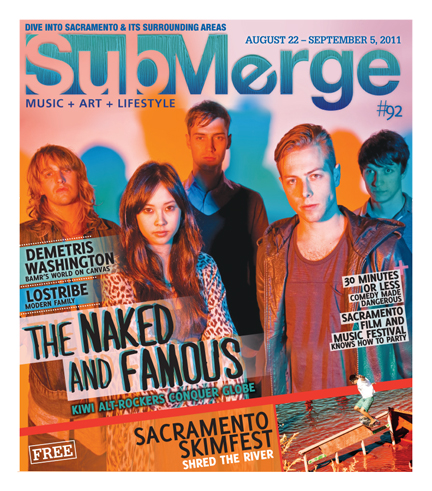
The Naked and Famous will play Harlow’s in Sacramento on Aug. 31, 2011 with White Arrows. Tickets are $15 and can be purchased through Harlows.com.
Kill the Precedent load up with a new EP
Industrial metal might conjure images of military-like precision with perhaps a totalitarian-style frontman at its controls. Kill the Precedent certainly evokes those images with their music. Thundering beats–both live and electronic–blast behind thrashing riffs and the two-pronged vocal attack of Twig the Exfoliator and The Ugly American. However, speaking with the two vocalists in a recent interview, the guys seemed jovial, bordering on jolly. For instance, if you were to call The Ugly American’s cell phone, you might hear The Dead Kennedys’ classic “California Uber Alles” playing while you waited for him to answer your phone. He said that since Jerry Brown was re-elected as governor, it seemed appropriate. “It’s such a fucking mess out here,” he quipped. “I thought it was pretty damn funny. At least it’s not an actor.” If KTP was indeed an army, in demeanor, they’d be more akin to the cool jokesters from Stripes than the cold-blooded killers of Full Metal Jacket.
Make no mistake, though; the band’s music is a no-holds-barred aural assault. KTP is ready to release a new EP, Stories of Science and Fantasy, which will consist of six original songs and two covers (The Smiths’ “Death of a Disco Dancer” and Jessica Lea Mayfield’s “We’ve Never Lied,” which Twig says was recorded in a hotel room in Oakland). Evoking the days when bands like Ministry and KMFDM crashed mainstream rock’s party, songs such as “Questions for Weapons” wield an imposing arsenal or metal riffs and huge beats, courtesy of electronic beatsmith/guitarist Hamburger, guitarist Killsbury and drummer Sgt. Pepper, while “Free Reign” is a throbbing, almost dance-y track highlighted by Jon the Jew’s pummeling bass line and an underlying, monolithic electronic groove.
Members of the band are no strangers to the Sacramento rock scene. They have played in bands such as Red Tape, Diseptikons and Rivithead in the past, but Kill the Precedent started as a side project of The Ugly American and Hamburger.
“Hamburger and I got together in 2006 and started screwing around with the drum machine,” The Ugly American explained. “We were kind of doing a little Big Black kind of deal, just having some fun. We recorded some music and got a hold of Twig, and I said, ‘I got to record some vocals, can you come down and help me out?’ We recorded vocals. Twig and I had been friends for many years, and he was giving me this blank stare, so I was like, ‘OK, you didn’t like it, but thanks for coming down and recording.’ And he said, ‘No, I want in. I’m fucking in.’ He took over from there.”
Twig’s introduction to the band was through the song “Cop Out,” which will appear on Stories of Science and Fantasy. More songs were started, but Twig said they were left unfinished. As each new member of the band became a permanent fixture, the songs began to flesh out.
“I wanted Killsbury to put a guitar riff over that–just that one song [“Cop Out”],” Twig said. “I’ve been in bands with all these other people in Red Tape and Diseptikons, and I was like just do this one song, but then it became do this song and that song…and eventually that’s how each member has come to be in the band.”
For The Ugly American, Kill the Precedent became a way of rediscovering the music he loved to make in the late ‘80s and early ‘90s with bands such as Rivithead and Battalion 53 after years of playing in punk bands.
“It dawned on me that I really missed that shit,” he said. “It was powerful, it was fun, it was endless. You could do whatever you want and get away with a hell of a lot more.”
In the following interview, KTP’s two vocalists fill us in on the making of the forthcoming EP and what draws them to making this kind of music. We find out that the reason why the harsh-sounding vocalists are so jovial is because they’re playing music they actually love.

It seems like industrial is a genre of music that’s gone back underground. Is that part of the excitement of revisiting it?
The Ugly American: Kind of, but not really. There’s no denying that those bands have had an influence. It’s obvious–and it should. It’s fucking awesome music… I can just say I missed the power of it.
Twig the Exfoliator: I liked the freedom of it. When we first started jamming around, with Jeremy from the Snobs, the bass player, was doing a bunch of electronic beats and me and [Ugly] would sing over it. It wasn’t hip-hop singing, but it was like a Fugazi overlay over dance music. I definitely wanted to not do just Ministry type stuff, but I wanted some melody in there to make it a bit different.
Listening to the music, you can definitely hear that sort of punk-type melodies.
Twig: Whatever [Hamburger] makes up beatwise and gives to us, half of them could be more on the dance side, some of them are more hard and fast, or slow and driving. If we hear something that we like, we’ll get working on that. Part of the reason why I wanted to do this was because I didn’t want to work with drummers anymore [laughs]. I was mad at all the drummers I’ve ever played with, and they take too long to set up. I was sick of loading all their shit into my van. That was the original idea, “Oh, we do whatever. We don’t need a drummer. Be like a hip-hop band, just plug in an iPod and do it like that.” That’s the way I wanted to do it. I wanted to put on a big production of a show, but within our budget.
Ugly: When Twig was on tour with Hoods–I think they were in Europe. He was adamant about it. He was like, “No drummers. I don’t want any fucking drummers.” Before we even put a drummer in there, I wanted one, because I wanted to add to the power and the beats and make it sound as large as we could. But he was all, “Hell no, we’re not doing it.” So, he goes to Europe and we grabbed our old buddy [Sgt.] Pepper. We brought him in to practice while Twig was gone. When he got back, he showed up for practice, and we were like, “Oh look, it’s…Pepper.” He was like, “You dick.” [Laughs.]
Twig: [Laughs] But it worked out.
Twig, you said you came in and did the middle section of “Cop Out,” but after doing that you wanted in. What drew you to this project?
Twig: I wanted to do something different. I wanted to do drum machines and just sample stuff by myself, but I’m completely computer illiterate. I don’t know how to do any of that stuff, and I couldn’t get anyone to do it. I talked to [Ugly], and they were already doing it for a couple of months, so I went in to record with them. The beats were big and huge, and it was something different. Since he let me even try something, and I could overlay a couple different vocal layers, and me and Sean could go back and forth instead of having to write a song’s lyrics all by ourselves–and you know, run out of breath–it made it better that we could share the vocal part. I liked that. I liked who he was working with, because I had known [Hamburger] from Rivithead and Battalion 53. We were also working with Evan at that point, Tha Fruitbat.
It seems like everyone who has come into the project has left their own stamp on it. Is that how the songwriting goes or do you start with the beats and go on from there?
Twig: Hamburger does all the beats and stuff. He’ll do two different parts with maybe some guitar, because he plays guitar too. He’ll just send us two-minute loops so we can get an idea about it. Then usually we will come up with singing structures, and then we’ll leave it alone. We won’t finish anything, and then we’ll bring it to practice and everyone else will listen to it and have their input. We start arranging the songs from there, cutting out parts, changing the drum beats, adding different parts, then we actually start writing the songs, the lyrics and stuff.
Ugly: It goes in reverse. It’s not the typical way you write a song, but it’s totally working for us.
Twig: Everyone’s really busy, so it’s all sent over the computer. Hamburger will send the beats to us, and we’ll pick the ones we like–the whole band will. And we’ll just work on it from there.
A lot of the bands we were talking about as influences before are largely associated with one guy, like Al Jourgensen for example, but it sounds like you guys actually play the songs to write them, which I think is kind of interesting for industrial music.
Twig: It’s like any other band. We’ll start arguing…but it all works out in the end as long as no one’s picky and tries to be the highlight of the song. Everyone knows their place.
Ugly: There are no egos, arrogance or bullshit. I know this sounds hokey, but it’s a completely collective effort. Everyone has their say. Like Twig says, we’ll argue to friggin’ death over it, but everybody’s got their two cents, and it just keeps piling things on without making it too much. It’s one cool idea after the other. It’s fun. I think the biggest thing is just that it’s a hell of a lot of fun.
I’ve seen that you guys have had girls in costume dancing at the shows, people covered in blood, synching up videos to your songs. Is that something you get together and collaborate on?
Twig: [Killsbury] handles most of the video stuff. He takes a while to get it with the beats and intros to every song. Except for [Hamburger], none of us are that great with computers. To do all that is a bit of a learning experience. And we don’t do it the way we should. We’re rolling into shows with DVD players and stuff, and a projector from like 1992.
Ugly: We try to change it up every time if we can. We did a good run, if you don’t mind me saying, at Blue Lamp. We called it “Cocaine Drug Dealers” or “Colombian Drug Dealers.” Everyone in the band was dressed up in cammo and we were dressed up in white suits. I filled up a bunch of baggies with flour. It was a great show, but it was the stupidest thing I ever did. Twig and I started throwing these bags of flour out into the audience and hit a fan. It went everywhere. Everyone was covered. I got off stage, and the guy was like, “It’s going to be $450 to clean up the place.”
Twig: It’s kind of like having sheet rock down or something. You can’t get rid of it… All the bottles were covered. We were like, “$450? No, we’ll come in tomorrow.” So we were hung-over as shit, and we had to be there at noon the next day. He was waiting for us with the mops, and he’s like, “Here you go.” Of course he opened the bar, and we got drunk and cleaned that place for four or five hours, and I can say it’s the cleanest it’s ever been [laughs]. It’s the cleanest club in Sacramento.
Kill the Precedent will play an EP release show at Harlow’s on Aug. 6, 2011 with Will Haven, The Snobs and City of Vain. Tickets are just $10 and can be purchased through Harlows.com. For more information on KTP, like them why don’t you at Facebook.com/killtheprecedent.
Forever Goldrush’s Amador Frequency finally gets the release it deserves
A phone call with a record label was all it took to breathe life back into a local band that has been indefinitely on hold for the past nine years.
If you were around Sacramento during the late ‘90s, you might remember a band called Forever Goldrush. The alt-country outfit was making a name for itself on the local scene, starting with the self-released album Unknown Territory in 1997. They released their second album Halo in My Backpack with Cargo Records in 1998. By 2002 they had toured everywhere west of the Mississippi River and were recording songs for their third album, which was completed, but never officially released, and the band started to lose momentum.
For starters, they couldn’t find a label to put out the record. The album received major interest, but nothing came of it. And touring had become overwhelming, setting the band up for burnout.
“Road dogging it was not really gonna do it for us any longer,” drummer Tony Cale said.
Without further ado, the band members went their separate ways. Vocalist Damon Wyckoff moved back to Amador County while the rest joined other local bands like the Regulars, Soft Science and the English Singles. That was until about three or four months ago, when they received a long-awaited phone call. After nine years, Sacramento record label Test Pattern Records called and said they wanted to put out the album.
Submerge met with Cale and bassist Mason DeMusey to talk about the resurrected album, Amador Frequency, which is due for its release on Aug. 2, 2011. It is a compilation pulled from 30-plus songs the band recorded over a span of six to eight months in 2002.
Cale and DeMusey agree that period was marked by musical exploration and experimentation, an explanation they offer for Amador Frequency’s unique sound. The limits of their musical palate were endless; they were soaking up the likes of Barcelona, Sigur Ros, Merzbow, Whiskey Town and ELO. Not to mention the fact their lead guitarist, Josh Lacey, had just left the band, leaving Wyckoff, Cale and DeMusey to do without while producing the majority of the album.
Thus the project quickly became a matter of figuring out how to creatively write songs without a lead guitarist. Turn up the synths and the noise guitars, according to Cale.
Amador Frequency is an entirely different package compared to FG’s prior two albums, Cale said, both of which were very roots-oriented and Americana. The band’s four original members grew up in Amador County, and since the band’s beginnings, “the County” has borne a heavy influence on defining the style of their songs. Lyrically, this album is no different, and songs like “Disconnected” and “Skeleton Keys” still retain considerable twang. But the album is rife with pop appeal, from its opening lighthearted number “Honey I Do” to “Rodeo Boys” and “The Letters.” Pearly synths highlight songs like “Silver Sweethearts,” while “Under the Apple Tree” and “Cup ‘o’ Gold” borderline shoegaze with glittering distortion and wizzing synths.
Nine years later and the band plans to record six more songs that will be different from the rest. Lacey has returned from North Carolina to record and play the album release show in August, the first Sacramento gig the band will have played since its one-time reunion show at Old Ironsides in 2007.
What hasn’t changed is the band’s ability to fly by the seat of its pants. Beyond the Aug. 2 show and recording at Radio Star recording studio this September, there are no set plans.
“Who knows what happens after that,” Cale said. “All this just sort of happened because Test Pattern showed interest in putting out the record, so now we’re just acting like a normal band.”
In what ways is [Amador Frequency] such a mass departure [from the other albums]?
Tony Cale: I don’t know, that whole period was a sort of sonic exploration, really.
Mason DeMusey: We were just pushing ourselves to be creative without [Lacey], and that’s actually pretty much what Amador Frequency ended up being.
TC: We were kind of dealing with a formula that we couldn’t complete, really, because we didn’t have all the components.
MD: Try to stretch our songs without guitar solos.
TC: Or just how much twang can you pull out of a dirge-y noise pop number or something like that? So it was sort of just a free-for-all, easily one of the loosest musical experiences of my life.
From what I’ve read, you’ve gotten comparisons anywhere from Creedence to Lynryd Skynryd, and of course, with the vocals, Eddie Vedder. Do you guys feel like these are very accurate?
MD: The first recording kind of stands on its own as a very alt, very, very country album. And, are those fair comparisons? I would ask a listener. Because I don’t think Skynryd is a very fair comparison to our first record and our territory. We’re not that southern pride.
TC: I like Lynyrd Skynryd.
MD: I do too! Don’t get me wrong, I like Lynyrd Skynyrd, but I don’t think that’s too fair of a comparison. Like I said, the first album actually was a lot more country than what Amador Frequency is now, and that’s part of the transition–where we were, and where we’re going now. But it’s fair enough in the respect that it’s very country. Banjo, mandolin, it’s okie. Pedal steel, you know.
So it looks like it had originally been contemplated for the album to be called Northern California, but then that changed?
TC: For Amador Frequency? Yeah there were definitely different titles going around…
MD: Yeah, I don’t know, I remember Amador Frequency just sticking to that record since the inception.
Would you say that because that was the theme of the album?
MD: Yeah, with a lot of Damon’s songwriting, again, since we grew up there, a lot of his writing is about these experiences growing up in a rural community, and so we kind of wear that on our sleeves all the time.
TC: When I first met these guys, they were flying the Amador flag really hard. I had never hung out with dudes that were so into their own county in my life, like just completely committed. Even though they were all down here working and doing their thing in the big city and shit like that…
MD: [Laughs] Yeah this was the big city!
TC: All they would do is talk about “the County.”
MD: That’s what us kids call it. Amador, we call it “the County.”
People have to be pretty excited right now, right? That a band that’s been gone for a while is just coming back?
MD: I would hope so, I mean, tickets went on sale today. I think that a lot of what’s motivating me, personally, is just the excitement I’m getting from these guys and from everybody else. And it’s been amazing. I mean, I called Josh, and I asked him if he wanted to come out here to do the CD release show just because it was such a great success and fun the last time I had him out here for the reunion show at Old Ironsides. And he basically told me that he’s been waiting for three years for this phone call.
TC: I mean, at the end of the day, it’s just really nice to be playing with these guys again, no matter what. I’m just really stoked that we get the opportunity to cut six more songs at the end of this summer. I mean, Amador Frequency, I hadn’t listened to that record in years, I’d forgotten about it. Just blew it off. I just thought it was one of those experiments. It may still very well be one of those experiments that…
MD: That fails horribly? But now we have the chance to find out.
TC: But if nothing else, I think the next two months is going to probably be some of the best two months Forever Goldrush has ever had.
Forever Goldrush’s Amador Frequency will be available from Test Pattern Records (Testpatternrecords.com) Aug. 2. The band will play a CD release show at Harlow’s in Sacramento on Aug. 12. Showtime is 9 p.m. and tickets ($9) can be purchased through Harlows.com.
Rocky Votolato prepares for another tour and looks toward writing a new album
It may not be “brain surgery,” but writing is certainly difficult work. Ask any working writer staring at a blank page for countless hours, and they’ll most likely tell you the same. In fact, it may certainly feel like brain surgery, because sometimes forming those words into sentences requires exhausting effort. Singer/songwriter Rocky Votolato has become rather familiar with the ardors of writing over the past decade. First working in bands such as Waxwing and now with his solo career, Votolato has shed blood on the page, crafting bullshit-free lyrics rife with personal meaning.
But Votolato doesn’t come off as overly emotional when you speak with him on the phone, nor does he seem to take himself too seriously. He’s pleasant, a regular working family man–married with two children, one of whom is about to graduate high school and head on to college, which he admitted was a little nerve-racking.
“She’s considering going to an art school–a college for art,” said the Seattle-based musician. “We’ve been looking into scholarships for that, so hopefully it will work out for her.”
Filling out financial aid paperwork is just another thing to add to Votolato’s full plate. In February 2010, he released his most recent full-length album, True Devotion, his first in almost three years. The time between 2007’s The Brag and Cuss and his most recent effort saw Votolato’s lifelong battle with anxiety and depression intensify. However, he was able to work through it. With a renewed sense of vigor, he released his latest album and has spent much of his time since on the road promoting it, playing hundreds of shows. With the distractions and tumult of life on the road, and a busy family life at home, it’s remarkable he’s able to find time to work on his craft at all–considering he, like many writers, prefers solitude while working.
“Writing is a solitary thing,” Votolato said. “If you can’t be alone, then you should never be a writer, because that’s what it’s all about. You have to be comfortable with yourself and your own mind.”
Though he does some writing while touring, Votolato said he prefers to do the bulk of his work at home where there are “creative resources” and he feels he can “fully devote time and attention to the craft of songwriting.” In order to achieve the level of solitude he requires to do his job, Votolato said that he relies on a strong sense of discipline, which is aided by the fact that he has a family.
“You have to be dedicated and disciplined,” he explained. “I get up at 8 every day, and I think the family gives you more structure than most musicians. But anyone who produces work regularly and does good work is usually working all the time and spending a lot of time doing it.”
In a recent conversation with Submerge, Votolato talked about preparing for his upcoming tour, which kicks off Feb. 18, 2011 in Portland. He also waxed eloquent about his writing process, of which he said he was “changing as an artist and figuring out more of what I want from the process of writing and what it takes to get something good out of it.” As it turned out, the plans for his upcoming tour were also in a state of flux.
You’re heading out on the road soon. What are you doing to prepare for this tour? Are you going out with a full band or will you be going out by yourself?
Well, right now that’s still undetermined, which is strange because it’s just a few weeks away, really. But I’m rehearsing and trying out people right now for a band I’m putting together. I haven’t found the right people. I’ve found the right guitar player, who is also going to sing backups, but he’s not available for this tour. He’s going to fly out to Chicago and meet me there, but he won’t be there for the Sacramento show. I’m looking for a drummer. So I could potentially have a drummer for the whole tour if I find the right guy, but I’m probably going to either do the shows for most of the tour as a duo with me and a drummer, or solo if I can’t find the right guy. Then the last eight shows of the tour, I’m going to have my guitar player come out and we’ll finish out the leg.
Is this normally how it comes together, or do you have it more prepared in advance?
I usually have it more prepared, but the thing is, I’ve been touring a lot, so it’s been difficult to figure out rehearsal times. It’s just been my schedule. I did close to 200 shows last year, so I was on tour all year, and I was just playing solo–not really with a band, and I’ve been doing it that way for the last couple of years. It’s kind of a new endeavor to try to find the right guys. Obviously, I’ve played with people in the past off and on, but this time, I’m looking for a more solid band to have go-to guys for hiring for shows and festivals. My vision is I’d like to have a band at some point–or at least have the option if I’d like to do a tour. I would like to do this tour with a band, but I just haven’t found the right guys yet.
You mention that you’re looking for the right guys; is there specific criteria you’re looking for?
It’s kind of like dating. When you meet the right person, you just know it. Music is like, once you start playing with someone, then you know how it feels on the musical side, but then there’s also the personality side, which you just have to be a really good fit. I’m just being really picky. I can go do shows by myself, and that’s fine with me. I’d rather have the right guys instead of dudes who are just filling in. I don’t want to play with just anybody.
You say you want to get together a regular band. Are you looking for guys you can go into the studio with for another record?
Yeah, that’s been the real struggle right now. Last week I tried out three different drummers and this week I’m going to practice with a bunch of dudes from Seattle. I’ve got a band potentially put together for the album, but some of the guys aren’t touring guys. They’re just really pro players here in Seattle, but they’re a little older and have families. It’s a hard mix to figure out exactly who is going to play on the album, but I’m already thinking forward about making another record, so I really want to get that worked out before I go back on tour.
Do you have more songs ready for a new album?
I’ve probably got half a record’s worth of stuff now, but we’ll see where it ends up. I like to keep it tentative at this point, because it’s so hard to know when it’ll be ready, but I’m definitely working toward it. I’m working on the songs now, and I still have another month to go before the tour, which I’m spending writing.
Before you said what you were looking for in the process of writing was changing. At this point, what do you think that is?
There’s this metaphor that this writing teacher talks about, and it’s basically like baking a cake is a good way to think of it. If you put ingredients in, the ingredients are the details of your life, like the eggs and the flour and whatever else you’re putting in there, and the heat is how you feel about those things in your life, and when you put those things together and put them in the oven then it makes the cake. That metaphor is a good way to describe how I’m trying to think about my writing process. The details of my life go into the soup and then it comes out on the other side where it’s not vague… I really see [my songs] as poems, and I want them to be good poems on their own first. At that point, I’m sure when I’m singing them that the lyrics will be good. That’s one thing that’s changed in the process. I’m really serious about wanting the writing itself to be good or better than anything I’ve done before.
For you it’s a twofold process. You write the words and the music. Does one drive you crazy more than the other?
They both equally drive me totally insane [laughs]. The writing does the writing. It does itself when it works. You just have to keep trying. Some days, I can write a piece of music and it just comes out, and, “Oh that took 10 minutes. That’s awesome.” The next day I’m playing guitar for four hours, and I still don’t have anything I like. It’s the same with the lyrics, or writing poems. I think the thing is to keep trying and keep the flow going and try to keep the internal critic from speaking up too much. [The voice that] says, “Oh, what is so and so going to say about that? Oh that sucks,” because I think we all have that going on too. I think that everyone who is trying to be a working artist is dealing with that. So it’s all about getting creative and finding ways to break through that. It’s a struggle, man. I’d be lying to you if I told you it’s easy for me. Just because I’ve been doing it for a living and have been doing it for 10 years, I don’t think it ever becomes easy. It’s a serious political act to be honest. So few people are.
Do you ever get squeamish about the details you reveal about your own life in songs?
No, only if I haven’t done a good enough job, I feel, as a writer. You can present anything in a way that’s creative and artistic if you do it with enough skill and craft and the right inspiration. Obviously, I feel like I’ve had some successes and some failures artistically, but they’re all successes in a certain sense because it’s a learning process… We’ll see where it ends up. I’m enjoying it. I’d rather be doing this than anything else. I know that.
See Rocky Votolato when he plays Harlow’s along with Laura Gibson on Feb. 21. Showtime is 7:30 p.m. and tickets cost $12.
Seminal San Franciscan Crew Fights Evil on New Album
It takes a band with the proper levels of collective ambiguousness to ascend the rickety ladders of the DIY underground. With the release of their 10th full-length studio album–and first for Chicago-based Polyvinyl Records after serving their formative years on seminal indie label Kill Rock Stars–Deerhoof has seen firsthand the ripening fruits of their labor.
Deerhoof Vs. Evil finds the 16-year-old quartet (multi-instrumentalists/aural alchemists Satomi Matsuzaki, Ed Rodriguez, John Dieterich and Greg Saunier, though there have been many lineup changes) reveling in a boundless creative explosion, full of pop/noise/electro/art rock hybrid jams with Matsuzaki’s characteristically minimalist lyrical plodding and Dieterich and Saunier’s dizzying compositional wizardry in top form. The fact that the band saw to it that every last shred of writing and production was carried out by themselves, in addition to their startling escape from the bosom of San Francisco–where they’ve been based since 1995–might have something to do with the variance in vibe. But you’d have to ask them.
So we did. Submerge caught up with Jack-of-all-trades John Dieterich in anticipation of the release of the new album–Jan. 25, 2011–as well as the band’s stop at Harlow’s on Jan. 27, 2011.
I understand the band left San Francisco recently. Where are you based now and how has the change in environment influenced the band, if at all?
Yeah, none of us lives in the same city anymore. I’m living in Albuquerque, N.M., now, which has been very interesting and completely new for me, as I’d never lived anywhere in the Southwest before. As for how this distance has affected the band, I think we’re in the process of finding that out. Our writing process has always been one in which each of us works alone, for the most part, so there’s not so much that’s different there. The situation has definitely forced us to be very productive when we’re together, so there’s maybe a little extra pressure in that sense.
The band has said in the past that the listener and audience play a large role in the interpretation of Deerhoof’s music. Explain the process of having no process in terms of creating your music.
I suppose that having no process in and of itself is a process, in that the same kinds of emotions and issues come up time and time again when we get together to work on an album. None of us really has any specific agenda, so we have to work out together what we want the album to be. That being said, we all have a lot of ideas, musical and otherwise, and especially now that we’re living in different places, I think we tend to veer off in different directions even more than before. That can make things very interesting when we then try to figure out how to synthesize our ideas.
In the respect of that ambiguity in your style, what collectively and what individually was the band vibing on with the writing and recording of Deerhoof Vs. Evil?
I really have no idea what everyone else was thinking about. As a band, I think we tend to talk a lot, but not much of that conversation revolves around what we’re listening to or what we like, though there is some element of that, I suppose. I guess we tend to treat each other’s material at face value, meaning that we don’t make any assumptions as to what that material is supposed to mean or is in reference to. We listen to it, and we try to make it something that we can all speak through. It sounds vague, but it really is quite simple in a way.
How did working without engineers, self-mixing, self-recording and without any outside input, affect the finished product?
It obviously affected it in a major way, but I don’t know exactly what would have been different had we worked with outside people. We just decided that we had a practice space where we could play, and while there were some issues with it–bands occasionally playing loud next door, etc.–it was also ideal in many respects. We have a few microphones and the ability to record ourselves. The cost of renting the room for an entire month was what we would have paid for a studio and engineers for a day, so it wasn’t too hard to make the decision. It gave us a lot more freedom to experiment in areas that we may not have been able to in a studio situation. Some of us had been working on recording/mixing/mastering projects for other people, and the move to deciding that we would just do everything ourselves was easy.
The new album bounces between a lot of different soundscapes–from disco-tinged jams like “Secret Mobilization,” to the dreamy electro of “Super Duper Electro Heads” to the pop-rock freakout of “Behold a Marvel in the Darkness.” What is different about Deerhoof’s approach to writing that makes you comfortable in such disparate realms?
It’s funny that the three songs you mention as being so different from each other were all written by one person–Greg! To be honest, I don’t think of them so much as disparate realms. Each of these songs as recorded is just one possible way of dealing with the abstract material of the composition. Sometimes we might just want to explore a certain kind of sound in a very abstract way, and we’ll decide that that sound might go well with this particular song, and so we will fuse the two ideas and see what happens. There are plenty of times when we discover that it doesn’t work–for one or more of us–and then we’ll have to find a way of making it something that we all feel is the best for that song in the context of everything else on the album.
It’s not that I don’t hear differences between the songs; it’s that I don’t see any conflict in the process of moving between them.
Satomi’s voice has now moved much more into the foreground than in previous records. Was this a conscious move?
It’s funny, that hadn’t occurred to me! You may well be right, though it could be a question of mix decisions or the type of material or anything that creates that feeling. I definitely love her singing on this record and feel like it shines in a new way.
What would you like to say to your Sacramento fans, most of whom are no doubt bleary-eyed in the face of a new decade, in advance of your Jan. 27 show at Harlow’s?
Why would they be sleepy because it’s a new decade? I would suggest more green vegetables. No, but we’re excited to come to Sacramento! It’s been quite a long time.
Deerhoof descends upon Harlow’s Thursday, Jan. 27, 2011. Tickets are $12, and the band hits the stage at 10 p.m. For more information, visit Harlows.com.
Cold War Kids
Thursday, Nov. 11, 2010 – Harlow’s – Sacramento
Before Cold War Kids took the stage in front of the tightly packed crowd at Harlow’s, audience member Valerie Valdez scanned the set list to see what the band had in store for her Thursday night. As soon as she realized her favorite songs weren’t there, she did what any fan would do and made her song request on a used napkin. It said in scribbles, “Hi guys, ‘We Used to Vacation’ [and] ‘St. John,’ Pleez” and placed it right by their set list, so the band would take notice.
After an opening set from We Barbarians, Cold War Kids took the stage with a roar from the audience and immediately went into their new songs, “Royal Blue” and “Finally Begin.” When they started to play a familiar tune, “Mexican Dogs,” the audience couldn’t help but rock their heads to the beat and join the band in singing the vocals.
The audience seemed to be pleasantly surprised that their set mostly centered around their upcoming third album, Mine is Yours, including new tracks, “Louder Than Ever,” “Audience,” “Bulldozer” and “Upside Down,” which resemble the same raw sounds as their 2006 album, Robbers & Cowards. But as soon as the audience recognized “Hang Up to Dry,” there was not a mouth in sight that wasn’t echoing the lyrics right back at the musicians.
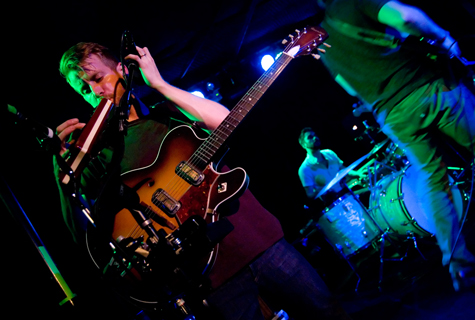
The indie rock group was completely focused on their music as each member lost himself while performing. Frontman Nathan Willett not only sang with his bluesy voice but banged away on an old brown piano. At one point, drummer Matt Aveiro was drumming with a drumstick, a maraca and a shaker with beads. Bassist Matt Maust seemed to be in a trance while he used the entire stage, almost colliding into band mate Jonnie Russell. Throughout the set the two members often played their instruments face to face within inches of each other, as if they were the only two people in the entire venue.
Even though the crowd seemed to be unfamiliar with the new tunes, bassist Matt Maust said he likes to stick to playing the new songs.
“It’s who we are right now,” explained Maust after the show, with his arms crossed. Maust admitted that before the show he decided to do a little antique shopping around town. The bass player said he feels a little dislocated in the city of Sacramento because he gets more of a “folksy” vibe from local residents as if he were somewhere in the Midwest. But as for the bittersweet transition from old songs to new ones, “It’s like breaking up with an old girlfriend.”
Who knows if they saw what was scribbled on the dirty napkin next to their set list, but the indie rockers decided to end their set with another crowd favorite, “We Used to Vacation.” During the song, guitarist and vocalist Russell used a maraca to bang on a cymbal that rested on a speaker case while tapping his foot on a tambourine. A lot of bands seem have trouble breaking out from the comfortable territory of their old songs, but Cold War Kids unleashed their new songs with ease.
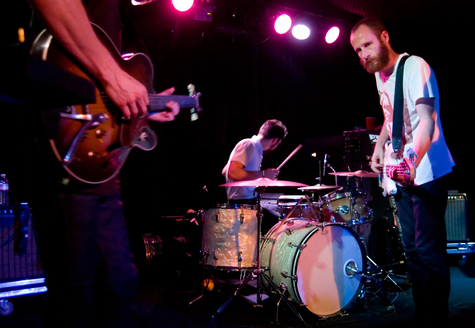
Helmet, Bison B.C., Will Haven
Harlow’s – Sacramento, Calif. – Wednesday, Sept. 8, 2010
Words by Bobby S. Gulshan
As promised on the flyer, Grady Avenell has indeed returned to vocals, and the local faithful flocked to Harlow’s for Will Haven. Some call it metalcore, or post-hardcore, but Will Haven’s particular brand of bombast proves too elusive for quick categorization. Opening with “I‘ve Seen My Fate,” the dual guitar attack combined with keyboard atmospheres and driving rhythmic breakdowns conspired to create a steady sonic barrage. Avenell’s searing screams hammered the point deeper. With his back often to the audience, Avenell and the rest of Will Haven tore through their set with high-energy physicality, head banging in lockstep with one another. Songs such as “Helena” and “Carpe Diem” displayed the straightforward appeal of Will Haven’s approach.


Their music relies on power and heaviness coupled with a driving rhythmic intensity. Tonally, the riffs were almost monochromatic, with guitarist Jeff Irwin providing occasional hints of color with high-pitched staccato runs. Closing with “Stick up Kid,“ the band displayed its full physical force, finishing up a blistering set of six songs that left the hometown crowd hungry for more.

Hailing from the Great White North, Bison B.C. took the stage in the second slot. On tour with Helmet in support of their new LP, Dark Ages, the Canadian metal outfit added classic thrash-style riffs to a night of hardcore punishment. The guys themselves look like modern primitives, as if they wandered out of the same deep forest as the mythical Wendigo, which they reference in one of their more epic tunes. James Farwell and Dan And provide guitars and vocals, one singing with a characteristic death metal growl, and the other providing a cleaner vocal on more melodic sections. As drummer Brad McKinnon told me after the show, “When I first heard Dio all those years ago, it hit a place, and it’s been metal ever since.” Indeed. Bison B.C. fills their sonic space with complex riffs and blistering solos, as well as hardcore breakdowns. “Slow Hand of Death” displayed Bison’s ability to combine thrashing riffs with off-kilter time signatures, moving seamlessly into a galloping melodic section, and then returning to churning extended breakdowns. “Wendigo Pt.1” featured both guitarists locked in harmonies that evoked one part Slayer, one part Iron Maiden. However, the development of the songs–particularly the ability to transition from a blast beat to an extended break with ease–is signature Bison. The Harlow’s audience seemed a bit unprepared for this metal onslaught, but showed their appreciation nonetheless.
Turning 50 doesn’t seem to have slowed Page Hamilton. By the time Helmet took the stage, Harlow’s was packed and surging, and the seemingly ageless Hamilton did not disappoint. He told the audience that he was supposed to be on a juice diet, and then promptly took a swig from his Corona. Hamilton played to the audience, constantly engaging them with wit and charm. At one point between songs, Hamilton brought up the subject of football, taking a quick shot at the Pittsburgh Steelers by pointing out that “their quarterback is a rapist.”
Helmet’s classic album Meantime was released in 1992. While new tunes still bear the signature of Hamilton’s “glory days,” nothing sounds dated. Helmet has mastered extended breakdowns, utilizing various downtuned and detuned setups to create deep, heavy tones. The almost mechanical rhythms are persistent and stark, while the start-and-stop nature of the riffs keep bodies moving with an internal groove. Hamilton’s clear vocal melodies are somewhat refreshing in an age where the growl has become the lingua franca of hardcore and metal. Yet the riffs and breakdowns are as hard as anything out there. Old tracks like “Ironhead” and “Role Model” blended perfectly with new material, like the title track of the new album, “Seeing Eye Dog” and “So Long.” The show, of course, would not be complete without a performance of “Unsung,” which jolted the crowd into a frenzied sing-along with Hamilton. The back and forth with the audience continued during the encore when Hamilton asked the audience to pick three songs. “Black Top,” “In the Meantime” and “I Know” finished off the show, as requested by the fans. For a band that hasn’t toured in some time, Helmet and Hamilton have not lost a step, and all indications point to a long and hard-hitting future for the hardcore legend.
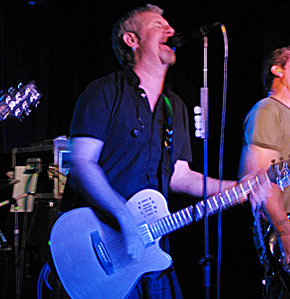
Young Dubliners
Thursday, June 3, 2010 – Harlow’s – Sacramento
Words & Photos by Anthony Giannotti
What’s the first thing that comes to mind when you hear the term Celtic rock? Hopefully not U2, maybe Flogging Molly, but more accurately you should think of Young Dubliners. After all, they are one of the most influential Celtic rock bands from the United States. After five years of skipping over the Sacramento area on tour, the Southern California-based Irishmen brought their flavor of traditional Irish folk and modern rock to Harlow’s night club Thursday night.
I had the privilege of witnessing it first-hand. After arriving a few minutes late and getting over the shock of a large portion of the crowd looking about the right age to have gone to high school with Betty White, I found the merrymaking in full swing. To fully appreciate the pub-like Irish folk, instrumental jam the Young Dubliners had broken into, I ordered a shot of Jameson with a Guinness back from the more than obliging bartender. Watching local Irish rockers BlackEyed Dempseys jump and bounce on the dance floor to the guitar-driven punk-inspired song “The Foggy Dew” set a mood that would make The Pogues proud.
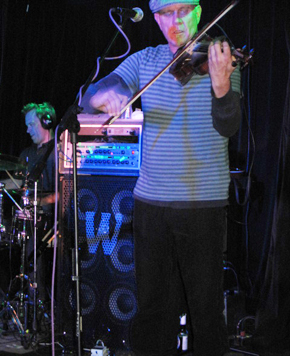
Young Dubliners lead singer Keith Roberts made the casual announcement that since the band hadn’t been to Sacramento in so long, they would be playing songs from all eight of their albums. Young Dubliners showed a softer side with a few heartfelt acoustic ballads such as “In the End.” A great deal of the lyrics off their new album, Saints and Sinners, speak out against how bad things have gotten internationally without losing the profound belief that things can and will get better. Traditional folk instrumental pieces such as “Ashley Falls” really allowed the well-seasoned musicians space to showcase their individual talents; specifically allowing fiddle player extraordinaire Chas Waltz some room to show off his chops. Not since Gilles Apap has such fine fiddle work been laid down; Waltz solos are a perfect blend of classical training and folk improvisation not to mention he plays in an intense Johnny Ramone-style power stance! Touring with the five-piece rock ‘n’ roll group was famed Uilleann pipe and pennywhistle master Eric Rigler. On some of the darker power ballads, he was able to make the already ominous bagpipes sound a little spookier with a slight delay on it. You might know Rigler for his work on such small movie soundtracks as Braveheart and Titanic. The accomplished piper treated the audience to the theme song from Braveheart, which I assume is the equivalent, for people of Celtic decent, as an American watching Jimmy Hendrix shred “The Star Spangled Banner” at Woodstock. Traditional Irish folk songs “Molly Malone” and “Seven Drunken Nights” really brought a bounty of dancers and hip shakers to the floor and ending the show with the Dropkick Murphys-ish power song “The Rocky Road to Dublin” set the small but enthusiastic crowd on fire.
After the great set and a few more Guinnesses I had a chance to chat with Keith Roberts. Through a barely decipherable Irish accent he first apologized for coming to Northern California and having allergies. After I apologized for arriving 15 minutes late, he assured me with a sly smile that those precious early minutes of the set were indeed the best part. Roberts did inform me that Young Dubliners planned on making Sacramento a regular stop on their touring schedule. “We are in the same freaking state for God’s sake,” he excitedly barked. Hopefully these words will hold true, because an evening spent with the Young Dubliners is an evening well spent. Make sure to catch their next Sacramento performance and you to will fully understand what Celtic rock means.

